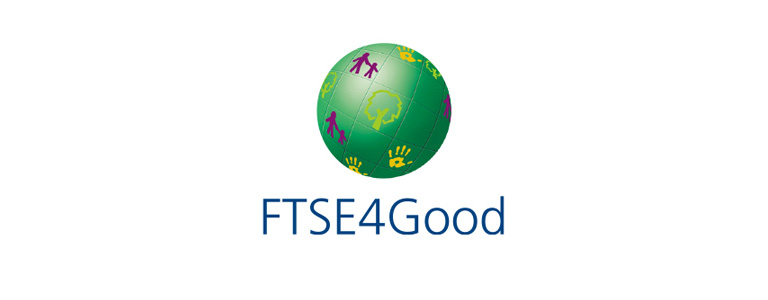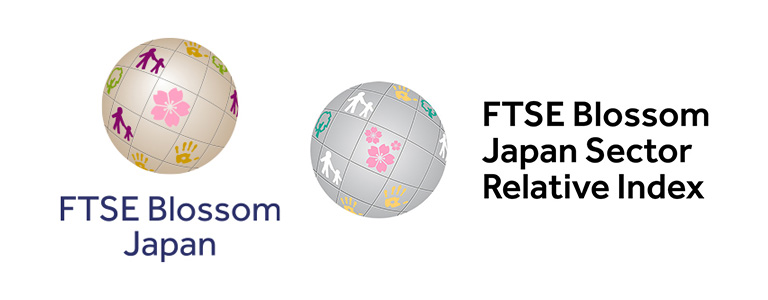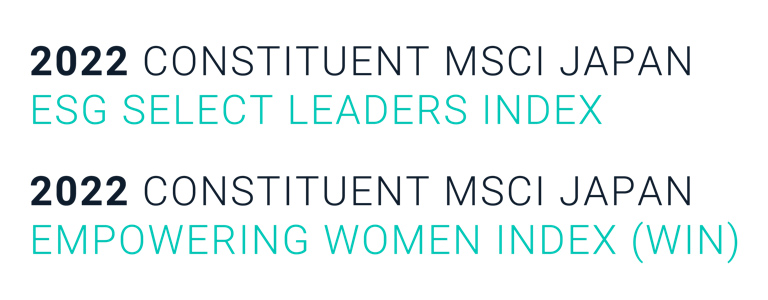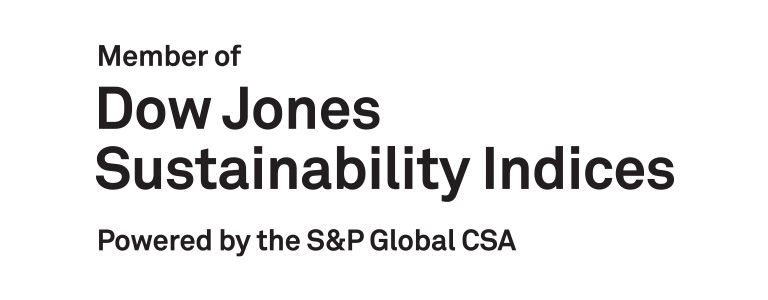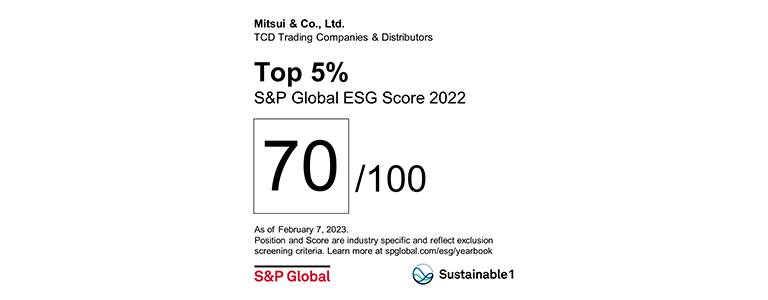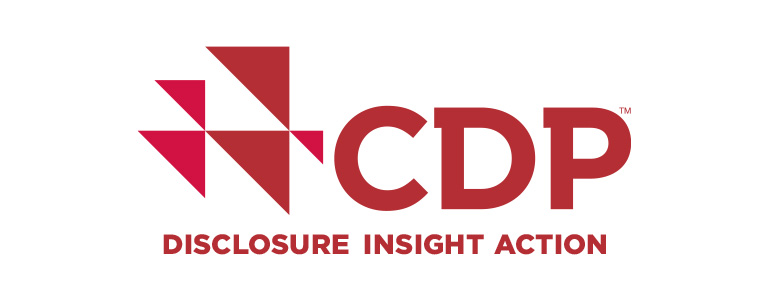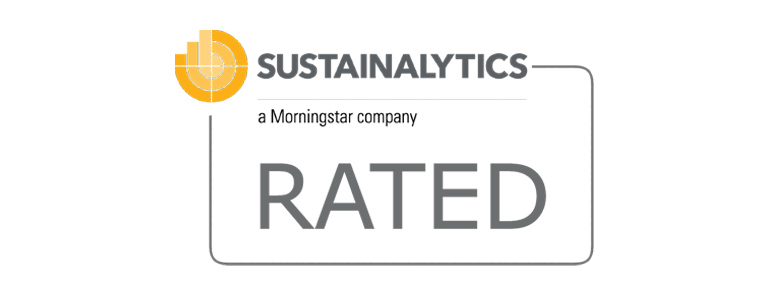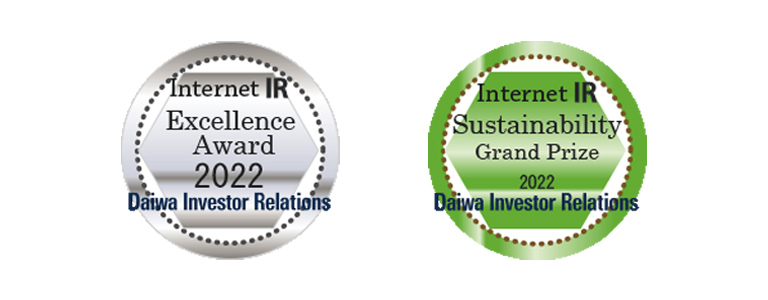Social
Supply Chain Management
Policies and Basic Approach
Mitsui & Co. conducts business across the world providing every kind of function and service from upstream to downstream areas. As a result, we have built a wide variety of supply chains. As a responsible member of global supply chains, we recognize that we need to engage in solving human rights and environmental issues not only within our group, but also throughout our supply chains. We have formulated a Sustainable Supply Chain Policy and Procurement Policies for Specific Commodities for certain raw materials and commodities in fields that pose a high risk of deforestation, environmental impact, or human rights violations. Both of these, which cover our approach to human rights and environmental issues, are shared with our suppliers. We also added a human rights clause template (in Japanese and English) to the general terms and conditions of our purchase agreements, and recommend that such purchase agreements require suppliers to comply with our Sustainable Supply Chain Policy, respect internationally recognized human rights, conduct and report on human rights due diligence, cooperate with questionnaires and site visits, and notify us and take corrective action when human rights issues are discovered. We recognize the supply chain-based environmental and social risks associated with the procurement of raw materials and commodities and we will strive to gain an understanding of issues associated with the supply chains through our business activities. In this way, we will realize stable supplies of sustainable raw materials and commodities.
Sustainable Supply Chain Policy
We will strive to understand the issues associated with the supply chains of our group's business activities in countries and regions around the world, in accordance with our Sustainability Policy and this Policy, and work with suppliers and other business partners to achieve a sustainable supply chain.
Expectations for Business Partners
We will require our suppliers and other business partners to understand and implement the following principles, and will work collaboratively with them to promote the objectives of this Policy across the entire supply chain:
- Respect for International Standards
- To ensure compliance with applicable laws and regulations of relevant countries, fair transactions in accordance with international rules and practice, and corruption prevention.
- Respect for Human Rights
- To strive not to infringe on human rights in our business activities, nor to contribute to human rights infringements by others through our business relationships, including supply chains.
- Forced Labor
Not to tolerate forced labor or any forms of modern slavery, including bonded labor or human trafficking. - Child Labor
Not to tolerate child labor and to comply with the minimum working age stipulated by the law. Not to hire individuals that are under the age of 18 for roles requiring hazardous work. - Discrimination
To prohibit any form of discrimination in employment. - Harassment and Inhumane Treatment
Not to tolerate any form of harassment, irrespective of whether it is physical or mental harassment. - Freedom of Association and Right to Collective Bargaining
To respect the rights of employees to associate freely and bargain collectively in our labor-management relations. - Working Hours and Wages
To properly manage employees' working hours, holidays, leaves of absence, and wages in accordance with applicable laws and regulations. - Occupational Health and Safety
To secure the health and safety of employees in the work environment. - Community impact
To conduct human rights impact assessments, covering issues such as prevention of pollution and water stress, for prevention of adverse impacts on the safety and health of local communities. To implement necessary measures in line with international standards to avoid risks and mitigate negative impacts.
- Initiatives to Address Environmental Issues
- To work with our suppliers and other business partners with the aim of achieving harmony with the environment in our business activities.
- Climate Change
To act to reduce greenhouse gas emissions. - Water Resources
To work to conserve water resources by reducing water consumption and improving the efficiency of water resource use. - Biodiversity
To assess the environmental impact of our business activities and work to conserve biodiversity. - Pollution Prevention
To act to reduce hazardous waste and pollutants and ensure the proper handling of any such materials, and strive to prevent air, water and soil pollution. - Sustainable Resource Use
To improve efficiency in the use of resources and energy and reduce waste.
- Safety and Security of Products and Services
- To ensure safety and security of products and services.
Remediation Guidance
If a business partner acts in violation of this Policy and causes an adverse impact on the environment or on human rights, we will provide remediation guidance to the business partner. If it is determined that the situation has not improved despite ongoing guidance, we will take measures including a potential reconsideration of the business relationship.
Information Disclosure
We will properly disclose information related to the above principles in a timely manner.
Formulated in December 2007
Revised in February 2022
Makoto Sato
Representative Director, Senior Executive Managing Officer,
Chief Strategy Officer (CSO),
Chairperson of the Sustainability Committee
Procurement Policies for Specific Commodities
The procurement of all raw materials and commodities is carried out under the Mitsui & Co. Group Conduct Guidelines, Environmental Policy, and Sustainable Supply Chain Policy. We aim to fulfill our social responsibilities as a company and contribute to the sustainable development of society through production and procurement based on a procurement policy for each commodity. For certain raw materials and commodities in fields that pose a high risk of deforestation, environmental impact, or human rights violations, we strive to realize sustainable procurement by working with NGOs and other stakeholders to formulate a procurement policy for each specific commodity as an addition to our other policies. These policies are regularly reviewed and revised as necessary.
Goals and Targets
We regularly review each goal and target and revise it when necessary.
Supply Chain Management
Please scroll horizontally to look at table below.
| Goals and Targets | Progress | FY Mar/2020 | FY Mar/2021 | FY Mar/2022 |
|---|---|---|---|---|
|
Ratio of new suppliers that have been sent the policy | 100% | 100% | 97% |
* Applicable to non-consolidated subsidiaries and consolidated subsidiaries as of the end of the fiscal year (excluding subsidiaries newly consolidated from January to March).
Natural Rubber
Please scroll horizontally to look at table below.
| Goals and Targets | Progress | FY Mar/2020 | FY Mar/2021 | FY Mar/2022 |
|---|---|---|---|---|
|
Ratio of new suppliers that have been sent the policy | – | 100% | 100% |
|
Ratio of traceable natural rubber | 100% | 100% | 100% |
Palm Oil
Please scroll horizontally to look at table below.
| Goals and Targets | Progress | FY Mar/2020 | FY Mar/2021 | FY Mar/2022 |
|---|---|---|---|---|
|
Ratio of new suppliers that have been sent the policy | – | 100% | 100% |
|
Ratio traceable to mill level | 99.8% | 99.1% | 100% |
|
Ratio of the above that is Sustainability certified | 5.0% | 6.9% | 11.2% |
*1 Mitsui's mill list is disclosed on the RSPO website. Please refer to this website.
*2 Palm oil certified by RSPO and similar organizations
Timber
Please scroll horizontally to look at table below.
| Goals and Targets | Progress | FY Mar/2020 | FY Mar/2021 | FY Mar/2022 |
|---|---|---|---|---|
|
Ratio of new suppliers that have been sent the policy | – | 100% | 100% |
|
Ratio of certified timber (Lumber*) | 100% | 100% | 100% |
| Ratio of certified timber (Woodchips for paper products*) | 100% | 100% | 100% |
*Lumber and woodchips for paper products that are handled by suppliers who are certified by internationally recognized forest certification bodies including FSC, PEFC, etc., or that are recognized by certification bodies as controlled materials.
Paper Products
Please scroll horizontally to look at table below.
| Goals and Targets | Progress | FY Mar/2020 | FY Mar/2021 | FY Mar/2022 |
|---|---|---|---|---|
|
Ratio of new suppliers that have been sent the policy | – | 100% | 100% |
|
Pulp that is derived from certified wood or from wood verified as legal* | 91% | 91% | 93% |
*Pulp derived from wood that has been certified by FSC or other internationally recognized forest certification bodies, or that has been managed in accordance with the guidelines of our procurement policy for paper products.
Sustainability Governance and Oversight
Sustainability Committee
The Sustainability Committee works under the Corporate Management Committee to plan, formulate and provide proposals on basic management policies, business activities, and corporate policies and strategies related to supply chain management.
The Sustainability Committee is structured so that its activities are appropriately supervised by the Board of Directors, and matters discussed by the Sustainability Committee are regularly discussed and reported to the Corporate Management Committee and the Board of Directors.
| Officer in Charge | Makoto Sato (Representative Director, Senior Executive Managing Officer, Chief Strategy Officer (CSO), Chairperson of the Sustainability Committee) |
|---|---|
| Administrative Office | Corporate Sustainability Div., Corporate Planning & Strategy Div. |
Please refer to the links below for more information on Mitsui's Sustainability Management Framework and the activities of the Sustainability Committee.
Supply Chain Risk Management System
By formulating the Sustainable Supply Chain Policy and taking the following stages of the Awareness-Identification-Surveys-Disclosures/Improvements cycle, Mitsui & Co. aims to prevent problems from arising and, furthermore, identify and resolve issues in the supply chain.
Details regarding the progress made, results achieved, and administrative conditions of our supply chain management are reported to the Sustainability Committee every year, and to the Executive Committee and the Board of Directors on a regular basis. We also share the comments from stakeholders and review each of the relevant policies if any issues are found.
Identifying High-Risk Business Areas
We employ external experts to assess human rights risks in the supply chains of products handled by Mitsui and overseas trading affiliates, as well as the main business operations of consolidated subsidiaries. These assessments are carried out for each product and country using international indicators and other tools. Human rights risks, including an exhaustive list of social, human rights, and labor practice risks that comply with international norms and standards concerning corporate social responsibility, are then identified in order to narrow down which fields are high risk. Following this, our business and the businesses of our subsidiaries are assessed as to whether they correspond to these areas. The results of these risk assessments identified area in which there is generally a high risk of the occurrence of human rights issues such as forced labor or child labor in our supply chains, mainly related to food, textiles, building materials, and mining, primarily in production regions in emerging countries in regions such as Southeast Asia, Africa, and South America.
New Suppliers
When engaging in business with new suppliers, we send all suppliers our Sustainable Supply Chain Policy and Procurement Policies for Specific Commodities, and request that all suppliers understand and implement our policies. We also conduct an advance risk assessment covering social issues (including environmental issues such as climate change) based on our own ESG due diligence checklists.
Existing Suppliers
For existing businesses and relevant suppliers, we have identified high risk areas within our business and we carry out regular surveys of suppliers in these areas. Through these surveys, we work to monitor the actual situation within our supply chains regarding environmental and social issues such as climate change, biodiversity, environment management, human rights, and occupational health and safety.
Corrective Action and Remediation Concerning Suppliers
Our suppliers are required to understand and implement our Sustainable Supply Chain Policy. If a supplier's efforts to implement our Sustainable Supply Chain Policy are insufficient, or if it is revealed that a supplier has environmental issues or human rights violations within their supply chain, we will take corrective or remedying action through appropriate processes.
Provisions in Agreements
In May 2023, we added a human rights clause template (in Japanese and English) to the general terms and conditions of our purchase agreements. The clause requires suppliers to comply with our Sustainable Supply Chain Policy, respect internationally recognized human rights, conduct and report on human rights due diligence, cooperate with questionnaires and site visits, and notify us and take corrective action when human rights issues are discovered. We are working to encourage the use of this clause internally.
Management of Hazardous Chemical Substances
In the chemicals segment, we review the handling of hazardous chemical substances. In Japan, these reviews are based on relevant laws and regulations such as the Chemical Substances Control Law, the Industrial Safety and Health Act, and the Fire Services Act. Overseas, these reviews are based on relevant local laws and regulations. In order to ensure that the results of these reviews are communicated appropriately throughout supply chains, we provide safety data sheets and ensure that products are properly labelled with hazard information. We also frequently hold various types of training to ensure that employees consider our responsibilities as an importer to disclose hazard information regarding imported chemical substances is exactly the same as our responsibility to disclose hazard information regarding our products manufactured in Japan.
Food Safety Initiatives
The Food Business Unit and the Retail Business Unit are building a food safety management database containing information such as movement by suppliers before import agreements are concluded, situations regarding the introduction of HACCP, handling under the positive list system for food container and packaging materials, residual agricultural chemicals, and labelling. We are using this database to check compliance with food-related laws and regulations, ensure proper import procedures, and disseminate information in order to facilitate the distribution of safe and reliable foods. We are also working to ensure employees are more informed. Internal committees for food sanitation management meet once a month to share information on revisions to various laws and other topics and we carry out various training on a monthly basis, such as food safety seminars.
Grievance Mechanism for the General Public and Other Stakeholders
On the Mitsui & Co, website, we have established the following framework for receiving opinions, proposals, grievances, and other feedback from customers and other stakeholders. When inquiries are received, we protect the privacy of the inquirers and ensure appropriate confidentiality.
Collaborating with Stakeholders
Participation in Initiatives
We are promoting and expanding our efforts to address our supply chain management through participation in initiatives. Participation in each initiative is decided after confirming that it is consistent with our basic policy and initiatives for supply chain management.
CEFLEX (Circular economy for flexible packaging)
CEFLEX is a European collaborative consortium of companies and associations representing the entire value chain of flexible packaging. CEFLEX is exploring the development of infrastructure systems to collect, sort, and recycle plastic flexible packaging. Mitsui has participated in the consortium since 2018 as one of more than 200 companies that are involved in the plastic packaging materials value chain. Mitsui has been playing active roles in various work groups and will continue to contribute to the realization of a circular economy through its participation in CEFLEX.
ASI (Aluminium Stewardship Initiative)
ASI was established in 2012 with a vision of maximizing the contribution of aluminum to a sustainable society. As of May 2022, approximately 226 companies and groups have joined ASI, including a variety of stakeholders such as aluminum producers and users and the International Aluminium Institute. Its purpose is to increase sustainability in the aluminum supply chain and contribute to ESG engagement by formulating international standards and establishing certification systems. Mitsui joined in January 2020 and supports these initiatives as a member.
Forest Stewardship Council® (FSC®)
The Forest Stewardship Council® (FSC®) is an international non-profit organization that promotes management of the world's forests in a way that is environmentally appropriate, economically viable, and socially beneficial, including with regard to respect for human rights. Mitsui has obtained FSC® forest management (FM) certification (FSC®-C057355) at all 74 of its forests, which in total approximately 44,000 hectares, while Mitsui Bussan Forest Co., Ltd., a Mitsui subsidiary, has obtained Chain of Custody (CoC) certification for the processing and distribution of cut lumber (FSC®-C031328). As one of the top private-sector suppliers in terms of volume of FSC®-certified Japanese-grown lumber, Mitsui is helping to promote FSC® in Japan and to discuss and draft the Japanese version of principles, standards, and risk assessments. Mitsui has obtained FSC® certification for its forest resources business as well, and promotes responsible management of forest resources.
Together for Sustainability (TfS)
Together for Sustainability (TfS) is a non-profit organization established mainly by major European chemical companies and engaged in sustainability-related activities. Since its establishment in 2011, TfS has carried out sustainability assessments and audits across entire chemical supply chains, from raw materials procurement to logistics. Mitsui & Co., Ltd. joined Together for Sustainability as the first Japanese company to join TfS. Mitsui will accelerate its sustainability-related initiatives in European markets, which are leading the world in this area. Mitsui will also use knowledge gained in said markets to improve sustainability across entire supply chains in global markets, especially in Asia and Japan.
RSPO (Roundtable on Sustainable Palm Oil)
The Roundtable on Sustainable Palm Oil (RSPO) is a non-profit organization established to promote the sustainable production and utilization of palm oil through the conservation of tropical rain forests and biodiversity. Palm oil production has been linked to the destruction of tropical forests through the development of oil palm plantations, as well as human rights issues. As a business that handles palm oil, Mitsui agrees with the RSPO's philosophy of contributing to sustainability through industry. Since joining the organization as an ordinary member in 2008, we have been collaborating on business-based sustainable procurement initiatives that take into account the conservation of tropical forests and biodiversity, respect for the rights of indigenous and local peoples, and other considerations. A sustainability-focused procurement code, including specific standards for palm oil, has been formulated for the 2021 Olympic and Paralympic Games in Tokyo. In connection with this, Mitsui representatives as members of an oil and fat industry association verified progress on and promoted initiatives related to the RSPO and activities under the Malaysia Sustainable Palm Oil (MSPO) and Indonesia Sustainable Palm Oil (ISPO) systems.
EcoVadis
EcoVadis is a ratings provider that has developed its own platform for evaluating the performance of companies in terms of environmental and social sustainability. Certain Mitsui group companies are registered on the EcoVadis platform and are evaluated on their performance regarding sustainability.
Sedex (Supplier Ethical Data Exchange)
Sedex is an NPO established in 2001 primarily by British retailers and auditing companies and it has become the top global ethical services provider. It provides registered companies with the world's largest information platform for managing and sharing data concerning ethical supply chains and it also offers globally recognized evaluations of responsible supply chain activities, known as SMETA audits, which audit aspects such as labor rights, occupational health and safety, environmental performance, and business ethics. Certain Mitsui group companies use the services provided by Sedex.
Initiatives
Animal Welfare Initiatives
We believe that raising domestic animals in a comfortable environment reduces stress on the animals and diseases, leading to greater productivity and safe animal products. Therefore, we strive to operate our businesses with consideration for animal welfare by respecting the recommendations of the World Organisation for Animal Health and complying with local laws.
Prifoods Co., Ltd., a consolidated subsidiary of Mitsui, raises broiler chickens in accordance with the Ministry of Agriculture, Forestry and Fisheries' Management Guidelines for Raising Broiler Chickens According to the Basic Approach to Animal Welfare, based on its belief that broiler chickens raised in a comfortable environment will be less affected by stress and disease, resulting in the production of safe and reliable chicken. Specifically, it creates a comfortable environments that put the lowest amount of stress possible on the chickens while they are in the growth stage and pays detailed attention to nutritional management, rearing environments, and health management.
Prifoods' production and manufacturing management structure, which includes its handling of animal welfare, has been evaluated by third party organizations. In its main production area, 14 farms have received domestic certification in the form of the JGAP group certification(*1), and its processing plant and 20 farms have received international certification in the form of the world's first SQF-TSA multisite certification(*2).
*1. JGAP (Japan Good Agricultural Practice) is a Japanese certification recognizing appropriate farm management in terms of farm management, food safety, animal hygiene, environmental conservation, worker safety, human rights and welfare, and animal welfare in accordance with the Ministry of Agriculture, Forestry and Fisheries' standards. In March 2020, Prifoods received this certification for 14 farms in Aomori Prefecture.
*2. SQF-TSA (Safe Quality Food-Tokyo Sustainability Addendum) is an addendum to the international SQF certification. It recognizes that in addition to ensuring food safety and quality under the SQF certification, the recipient also meets the food safety and hygiene standards, which include animal welfare, stipulated by the Tokyo Organising Committee of the Olympic and Paralympic Games. A processing plant and 20 farms operated by Prifoods in Aomori Prefecture acquired SQF certification in October 2010 and in November 2019, they received the world's first SQF-TSA certification.
Fisheries Initiatives
We recognize the risk that overfishing, illegal fishery operations and destructive fishing practices can lead to a loss of biodiversity and have a severe impact on local communities in marine areas, as well as the risk to the environment if aquaculture businesses insufficiently manage water intake, feed supply, and excrement.
Therefore, we have made it a priority that our aquaculture businesses incorporate a sustainability perspective in order to protect marine resources and realize stable and sustainable supplies of marine products. As a group that handles marine products, we work to raise and procure these products in a responsible manner, giving consideration to the conservation of marine resources and ocean environments and to coexistence with local communities.
Toho Bussan Initiatives
Mitsui subsidiary Toho Bussan Kaisha Ltd, is primarily engaged in trading marine products and it requires that the marine products in its commercial transactions have CoC certification to ensures traceability. CoC certification assures that certified products have been managed appropriately at every stage of production, from manufacturing to processing and distribution, and it also guarantees that there is no contamination by uncertified products and that labeling is authentic. Toho Bussan strives to procure sustainable products and it has acquired both MSC and ASC CoC certification. It has also concluded an endorser agreement with the Global Seafood Alliance (renamed from the Global Aquaculture Alliance in April 2021), a U.S.-based NGO that operates BAP, a certification system that is widely recognized in the U.S., and it is working to promote the spread of BAP certified products.
Quantity of Certified Products Handled by Toho Bussan
Please scroll horizontally to look at table below.
| FY Mar/2020 | FY Mar/2021 | FY Mar/2022 | |
|---|---|---|---|
| Quantity of marine product transactions (MT) | 13,827 | 14,418 | 14,559 |
| Ratio of MSC certified products | 0 | 0 | 0.3% |
| Ratio of ASC certified products | 0.8% | 2.6% | 11.5% |
| Ratio of BAP certified products | 0.9% | 3.9% | 4.9% |
Salmones Multiexport Initiatives
In 2015, we invested in Salmones Multiexport S. A. ("Salmex"), a Chilean company that farms, processes, and sells Atlantic salmon. Salmex applies a vertically integrated business model to the farming and sale of salmon, including its mainstay product of Atlantic salmon, and it exports to Brazil, Japan, China, and other Asian countries, and particularly to the United States, amid growing demand for healthy protein sources. It has also acquired various certifications relating to environmental performance, quality, occupational safety, and traceability, including OHSAS18001*, ISO14001*, ISO9001*, BAP, and Global GAP. Since the early 1990's, Chilean salmon aquaculture has provided the largest amount of salmon exports in the world after Norway. During this time, in addition to establishing a fish-disease and quarantine control system, government and industry have worked together to reduce the use of chemicals. As a result, significant reductions have been achieved, and Salmex is continuing with its own efforts to reduce chemical consumption. Also, the use of fishmeal and fish oil in feed has been greatly reduced by substituting it with raw materials such as soybean meal and vegetable oils. In recent years, fish meal has accounted for less than 10% of feed. As demand for high-quality, safe and secure protein sources continues to increase worldwide, we will work with our suppliers to develop a sustainable aquaculture industry that can coexist harmoniously with local communities, local residents, and ecosystems.
*Certification covers the management and operation of fish farms and plants.
Quantity of Certified Products Handled by Salmex
Please scroll horizontally to look at table below.
| FY Dec/2019 | FY Dec/2020 | FY Dec/2022 | |
|---|---|---|---|
| Quantity of marine product transactions (MT) | 95,475 | 99,240 | 97,815 |
| Ratio of ASC certified products | 7.8% | 11.1% | 13.0% |
| Ratio of BAP certified products | 100% | 100% | 100% |
Engagement with Suppliers
Policy Promotion and Awareness Raising
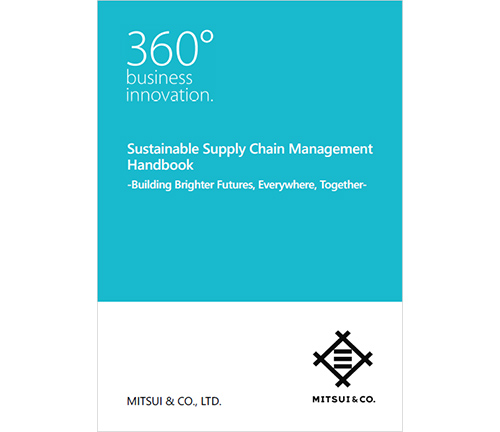
When engaging in sales transactions, we work to ensure that all Mitsui suppliers are aware of our policies by sending our Sustainable Supply Chain Policy (in Japanese, English, Chinese, French, Spanish, Portuguese, and Thai) to all suppliers of our business units, overseas offices, and subsidiaries (excluding indirectly owned subsidiaries), and requiring their understanding and cooperation in regard to the policy. We manage the supplier awareness situation through an annual inhouse survey that confirms the status regarding the sending of these policies.
In addition to policy promotion, to further raise awareness among suppliers and other business partners, we have prepared a "Sustainable Supply Chain Management Handbook" that explains our policies and initiatives, the background and issues related to sustainability in the supply chain (e.g. workers' rights), and specific methods that suppliers and other business partners can use to carry out initiatives.
Supplier Training
In order to raise awareness regarding our Sustainable Supply Chain Policy and supply chain management initiatives among suppliers of Mitsui and consolidated subsidiaries, as well as employees of Mitsui and consolidated subsidiaries engaged in procurement, in March 2022, we invited an external speaker from the international conservation NGO WWF Japan (World Wide Fund for Nature Japan) to hold an online training session on environmental and human rights issues concerning the natural rubber, palm oil, timber and paper products businesses. A total of 130 employees from Mitsui and suppliers participated in the training and were required to understand and implement initiatives to reduce environmental impact, including conserving biodiversity and eliminating deforestation, and to promote human rights due diligence, including protecting the customary rights of indigenous and local peoples, and improving labor environments.
In the fiscal year ending March 2023, we invited Daisuke Takahashi, an attorney at Shinwa Sohgoh Law Offices who supervised the "Sustainable Supply Chain Management Handbook," to give an online training to Mitsui's business partners and employees, and those of Mitsui's consolidated subsidiaries. The training explained Mitsui's human rights policy and initiatives and how to conduct due diligence related to human rights in supply chain management. Approximately 250 business partners and employees participated in the training, gaining a deeper understanding of these issues. We plans to continue providing regular training to suppliers and employees involved in procurement.
Auditing (Supplier Surveys and On-Site Inspections)
We consider interactive communication with our suppliers to be very important, so we work to build relationships of trust and strengthen our supply chain management by working jointly on ideas for improvements with our partners, wherever needed. For this reason, since the fiscal year ended March 2012, we have been conducting surveys targeting the suppliers of Mitsui and our subsidiaries to confirm the status of their business in regard to social issues such as climate change, biodiversity, environmental management, human rights, labor practices, and occupational health and safety, and to provide correction if necessary. In the fiscal year ended March 2020, we began surveying suppliers that handle products in high-risk business domains as part of human rights due diligence.
In addition to the surveys, since the fiscal year ended March 2015, we have been regularly carrying out on-site audits of suppliers by external experts. Additionally inspecting compliance with our Sustainable Supply Chain Policy using a checklist, we also employ independent experts to participate in conducting interviews with persons in charge and carrying out observations of manufacturing plants and related facilities. When required, we also provide advice and guidance following the on-site surveys.
Providing Feedback and Requesting Improvements Based on Auditing Results
Our auditing efforts did not detect any major environmental problems or human rights violations, but there were cases in which understanding of the Guiding Principles on Business and Human Rights, as well as international norms and local laws and regulations, was insufficient and we also found suppliers who did not have clear policies, such as an approach to occupational health and safety or to human rights. We improved the understanding of these suppliers regarding international norms and other matters by reiterating the content of our Sustainable Supply Chain Policy, alongside other actions such as proposing the formulation of policies.
Number of Suppliers Surveyed
Please scroll horizontally to look at table below.
| FY Mar/2020 | FY Mar/2021 | FY Mar/2022 | |
|---|---|---|---|
| Number of suppliers surveyed | 11 | 293 | 44 |
Main Questions in Supplier Surveys
| Human Rights, Labor |
|
|---|---|
| Occupational Health and Safety |
|
| Business Ethics |
|
| Environmental Management |
|
| Conflict Minerals |
|
| Supply Chain CSR |
|
On-Site Inspections of Suppliers (Auditing)
| Suppliers surveyed | |
|---|---|
| FY Mar/2022 |
Suppliers of food raw materials In the fiscal year ended March 2022, Mitsui conducted an online survey of the six main suppliers (two based in India, one in Indonesia, one in Kenya, one in Malawi, and one in Sri Lanka) of Mitsui Norin Co., Ltd., a consolidated subsidiary which manufactures and sells black tea, green tea, beverages for vending machines, and other products. Based on answers to questions sent to the suppliers in advance, we conducted interviews to confirm the policies, initiatives, and labor and supply chain management practices at each company. While certain suppliers did not have policies in place or manuals prepared relating to occupational health and safety, we were able to confirm that these companies are implementing initiatives for the respect of human rights. |
| FY Mar/2021 |
Suppliers of wooden fuel In the fiscal year ended March 2021, Mitsui and an external expert jointly conducted on-site surveys of Mitsui Bussan Forest Co., Ltd. and Butsurin Co., Ltd., which are the main suppliers of wooden fuel to Tomakomai Biomass Power Co., Ltd. ("TBP") and Hokkaido Biomass Energy Co., Ltd. ("HBE"), companies in which Mitsui has an equity interest The surveys lasted three days and consisted of site inspections of their suppliers' plants, forests, and other facilities, interviews with managers and workers, and checks of related documents. The main focal points of the surveys were raw material procurement, occupational health and safety, and environmental management. The results of the surveys confirmed that both companies are taking appropriate action on all items, and that both factories meet the requirements stipulated in our Sustainable Supply Chain Policy. |
| FY Mar/2020 |
Suppliers of apparel products In the fiscal year ended March 2020, Mitsui and a third-party expert jointly conducted on-site surveys at the suit factory of MAY10 Joint Stock Company ("MAY10"), and the sewing factory of Viet Thinh Garment Joint Stock Co. ("Viet Thinh") in Vietnam. Both are suppliers of Mitsui Bussan I-Fashion Ltd. (currently MN Inter-Fashion Ltd.) , Mitsui's consolidated subsidiary, which trades in textile raw materials, industrial raw materials, and woven and knitted fabrics, and also produces and procures apparel and fashion goods, as well as accessories. The surveys lasted two days and consisted of site inspections, interviews with managers and workers, and checks of related documents. The main focal points of the surveys were human rights, occupational safety and health, compliance with laws and regulations, environmental management, and relationships with local communities. The results of the surveys confirmed that both companies are taking appropriate action on all items, and that both factories meet the requirements stipulated in the Supply Chain Policy. |
| FY Mar/2019 |
Supplier of seafood (salmon), feed manufacturer In the fiscal year ended March 2019, we visited a Chilean salmon farming, processing and sales company, Salmones Multiexport S. A., which Mitsui has invested in and which we procure from, and carried out on-site surveys of freshwater and seawater farms, a processing plant, and a feed company which is one of the Salmex's main suppliers. We inspected farming facilities including a hatchery, a sea water farm with a pontoon, feeding control units and a set of net pens. At the processing plant, we inspected the processing and packaging lines, automatic quality sensors, smoke facilities, and washing rooms. We also conducted interviews with managers and employees. Through these, we checked environmental management, human rights and labor practices, regulatory compliance, and quality control and traceability. At the feed factory, we inspected processing facilities, storage warehouses, the main control rooms, and the quality control rooms, and conducted interviews with managers and employees. Through these, we confirmed that initiatives are being properly implemented in respect to the environment, labor and safety, and traceability. |
| FY Mar/2018 |
Supplier of oleochemical products (oleochemicals) In March 2018, we visited the factory and plantations of a Malaysian oleochemicals manufacturing company that we procure from and carried out on-site surveys. At the manufacturing company's factory, we inspected the manufacturing processes, the quality control laboratory, the control room, storage facilities, packaging processes, the wastewater treatment facility, and the employees' canteen, and conducted interviews with the managers and employees. Through these, we checked environmental management, human rights and labor practices, regulatory compliance, and quality control and traceability. At the palm plantations, we inspected the plantations, the oil mill, and the biomass power plants and conducted interviews with the managers and employees. Through these, we checked that initiatives are being implemented in respect to the environment, as well as safety and labor practices. Results from the surveys showed that the supplier was acting appropriately, and that all items met the requirements of our Supply Chain CSR Policy. |
| FY Mar/2017 |
Supplier of food raw materials (apple juice) In September 2016, we visited a fruit juice processing company that we procure from in Shandong Province, China, and carried out on-site surveys of its factories and fruit farms. We inspected a variety of workplaces, including a fruit farm, fruit transportation equipment, juice extraction factories, chemicals storage facilities, quality inspection rooms, filling factories, low-temperature warehouses, wastewater treatment facilities, control centers, canteens, and dormitories and conducted interviews with factory supervisors and farmers. Through these, we checked various aspects of suppliers' operations, including environmental management, labor practices, regulatory compliance, and quality control and traceability. Results from the surveys showed that the supplier was acting appropriately, and that all items met the requirements of our Supply Chain CSR Policy. |
| FYE Mar/2016 |
Suppliers of wood chips (raw material for pulp and paper) In March 2016, we conducted on-site surveys of timber suppliers and their plantations, processing and export companies, and forest management contractors at six locations in the Green Triangle region of western Victoria, Australia, where we procure wood chips for pulp and paper manufacturing. Through on-site inspections of plantations, processing facilities (chipping), and stockyards, as well as interviews with representatives of log suppliers and forest management contractors, we checked various aspects of suppliers' operations, including regulatory compliance, environmental performance, and labor practices. Results from the surveys showed that all suppliers were acting appropriately, and that all items met the requirements of our Supply Chain CSR Policy. |
Initiatives Concerning Subsidiaries and Affiliates
Starting from the fiscal year ended March 2021, we are carrying out internal supply chain management surveys of our subsidiaries in order to ensure they properly understand our Sustainable Supply Chain Policy and that it is implemented by their suppliers. The surveys investigate matters such as how well the group's policies are understood and what criteria are being used to check suppliers. Feedback is provided to subsidiaries together with explanations of policy details aimed at improving understanding.
For the fiscal year ended March 2022 survey, we selected Mitsui Norin Co., Ltd. ("Mitsui Norin") and Mitsui Kaset Phol Sugar Limited ("KPS"), a Thailand-based sugar manufacturing company, and conducted online surveys. Through interviews with managers and employees, we explained our approach to supply chain management and reiterated our requirement that our policies be accepted and implemented, while at the same time checking aspects such as to what degree our Sustainable Supply Chain Policy is understood, the status of sending the policy to suppliers, standards for selecting new suppliers and accompanying management frameworks, and whether companies have internal regulations and policies.
Through our survey of Mitsui Norin, we confirmed various ESG-related initiatives, including the formulation of an environmental policy, supply chain management through the use of a dedicated tea plantation system, employee training, and initiatives to set and achieve targets at factories. Through our survey of KPS, we confirmed various ESG-related initiatives, including the formulation of a code of conduct and sustainable supply chain policy, supply chain management through contracted sugarcane farmers, CSR activities including communication with neighboring residents, and employee training. We recommended that Mitsui Norin and KPS from here on address supply chain management in relation to human rights in addition to quality control, which is their primary objective.
Issues Revealed Through Recent Surveys and Improvement Guidance
Surveys carried out to date have confirmed that affiliated companies are practicing supply chain management based on our Sustainable Supply Chain Policy. However, it was also revealed that the policy had not yet been sent to some suppliers, so we responded by belatedly sending the policy to these suppliers and requesting that they understand and implement it.
Employee Initiatives
Raising Awareness and Training
We continuously carry out awareness raising activities and training for employees regarding the importance of human rights and labor issues and the details of our policies in order to raise sensitivity to issues, including human rights and labor issues, and to prevent problems before they can happen.
Training Track Record
Please scroll horizontally to look at table below.
| FY Mar/2021 | FY Mar/2022 | FY Mar/2023* | |
|---|---|---|---|
| Number of participants | 392 | 6,000 (approx.) | 450 (approx.) |
*As of October 2022
